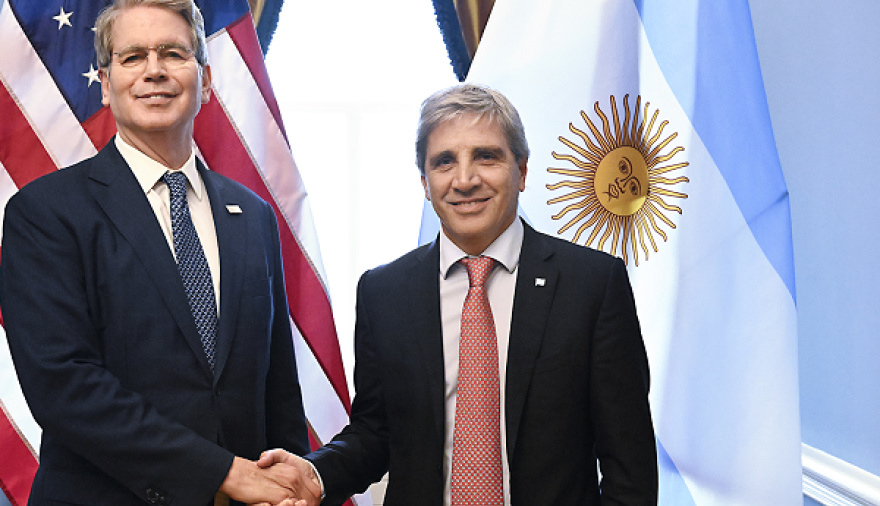
The head of the United States Treasury, Scott Bessent, assured this Wednesday that the bailout for Argentina would reach USD 40,000 million, of which USD 20,000 million correspond to the currency swap (an exchange that would increase the reserves of the Central Bank, but which is difficult to use) and another USD 20,000 million are being negotiated with private parties, especially banks. It is a new message to try to calm the financial crisis, but the distrust is total, the results only lasted a couple of hours and all values worsened again.
“The US Treasury bought Argentine pesos in the market this morning,” declared Bessent. The question is how many days we will read the same words again, what amount they are willing to give to guarantee low-cost capital flight. But they had a limited effect, the official dollar operated this October 15, closing at $1,355 for purchase and $1,405 for sale, canceling the drop it had had after the announcements.
The problem for the Government is that the foreign exchange reserves of the Central Bank (BCRA) continue to fall, fueling forecasts of a devaluation after the elections. This Wednesday they fell another USD 164 million, accumulating a loss of USD 513 million in two days. The cause is, if not, the debt; Official sources stated that USD 225 million was paid, distributed between the CAF (Development Bank of Latin America and the Caribbean) and the International Bank for Reconstruction and Development (IBRD).
In parallel, the Ministry of Economy only managed to renew 45.68% of the debt maturities in pesos this Wednesday and had to cancel $2.1 billion. Will Bessent go out and buy them these days to continue maintaining the dollar in arrears?
The North American official’s statements came after Tuesday’s collapse, when the market reacted to the alleged conditioning of Trump, who had made the financial rescue subject to the October 26 election result. The president of the BCRA, Santiago Bausili, acknowledged in an interview that “there is an enormous demand for coverage” and added that it is an “extreme situation.” Although he did so to argue that it is a “political shock” that “will have passed after the elections.” An optimism that is not shared by anyone outside the governments of the United States and Argentina.
The truth is that the setback of the Trump-Milei meeting, which Bessent sought to counteract with his announcement, increased doubts about the future of the exchange rate scheme. Although Minister Luis Caputo also ratified the continuity of the band system, Wall Street projects an inevitable jump: Morgan Stanley places the dollar at $1,700 by the end of the year even in its most optimistic scenario.
A rescue for the great businessmen who are friends of Bessent and Caputo
From the US capital, Luis Caputo described the agreement as “spectacular support” and thanked Trump: “Donald Trump is our number one fan. If we continue on this path, this is an opportunity for all Argentines,” he said. For his part, Bessent was explicit about the political nature of the support: “A victory would imply maintaining a level of blockade on any negative policies, so that the President can veto them. Argentina will have the support of the United States as long as it continues with these policies.” In other words, the financial “bailout” is tied to the continuity of the adjustment program, trade opening and financial speculation.
This model of backward dollar and financial income is not sustainable. The supposed help from the Treasury and the IMF only seeks to guarantee the profitability of speculative capital while the social crisis deepens. The details of the new debt are not yet known, but it is clear that it will not be free. The International Monetary Fund (IMF), headed by Kristalina Georgieva, insists that the Government must move forward with labor and pension counter-reforms, which would imply a new blow to the working class.
Deepening dependence on the IMF and the United States can only bring worse living conditions for working people. Peronism does not propose a break with imperialism, on the contrary it comes from validating in Congress the fraudulent loan of USD 45,000 million that Macri contracted to finance his campaign. Since then, between the governments of Alberto Fernández and Javier Milei, more than USD 52,387 million in debt interest were paid. Only the deputies of the Left Unity Front (FIT-U) have voted against this odious debt in Congress.
Recent history shows that mobilization and organization from below can open scenarios of rupture and profound transformation. So that the crisis does not continue to be paid by the vast majority, it is necessary to build a political and social force that stands up to the IMF and adjustment. The only way out in self-defense for the working people is to denounce this surrender pact, break the submission agreement with the IMF and the United States and impose, through mobilization, the non-payment of the odious debt.
Source: www.laizquierdadiario.com
